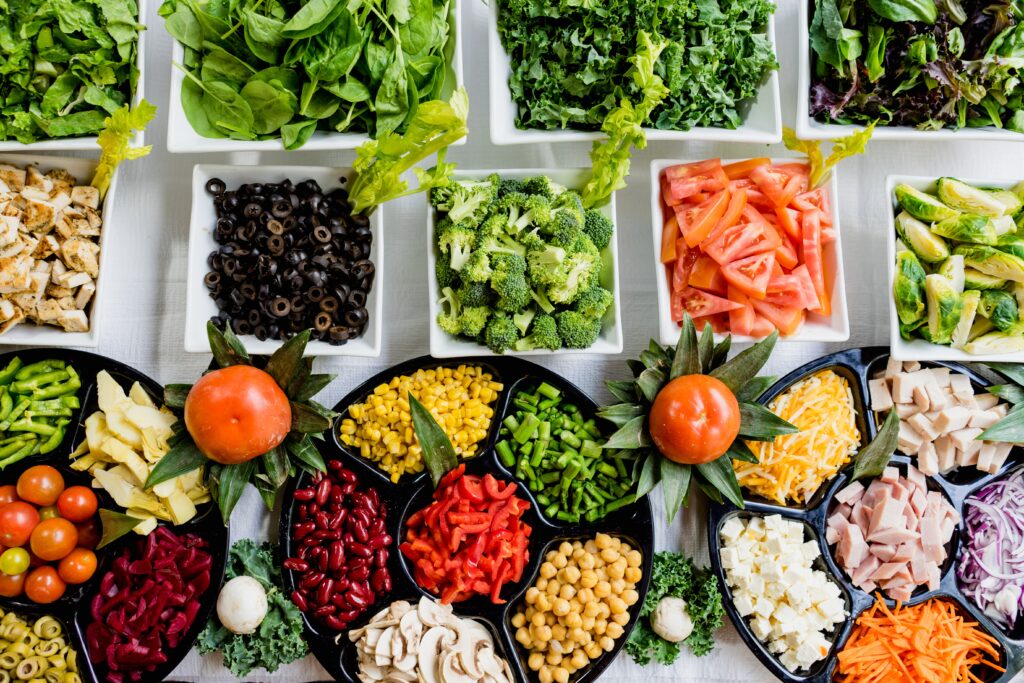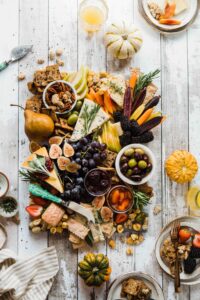Hola Amigos (Hello Friends),
While food is the source of pleasure and sometimes pain for all of us each day.
What I mean by that is each day we spend time thinking about what to eat, what to cook, where to go out and eat, where to get our food from, have I got enough in the house, avoiding certain foods, limiting intakes of food, overindulging on foods, eating healthy sometimes or all the time, sharing and preparing food and then doing it all over again.
It really takes up a fair bit of time don’t you think! It sure does for me and I have no doubt for you too.
But what actually happens when we eat and how does our body get the nutrients we need from food.
Let’s first talk about the nutrients our body needs each day to support our health and provide the energy and processes for our body to function.
There a 7 nutrients our bodies need, with the food we eat comprised of macro and micro nutrients as well as water that give the body energy for our bodily functions, to maintain good health, and survival.
Macronutrients are carboydrates, protein and fat that provide calories which fuel the body with energy while also playing specific roles in health.
Micronutrients are the vitamins and minerals and phytochemicals (plant chemicals, compounds in plants) while not providing any calories they serve a variety of critical functions to allow the body to work optimally.
The Macronutients
Protein
Proteins provide Amino Acids to the body which you would call the building blocks of proteins.
Essential for growth, development, repair and maintenance of the tissues in the body. Proteins repair tissues that are damaged and helps immune cells fight inflammation and infection. Protein provides structure to the muscles and bones.
Lean meats (beef, chicken), seafood (fish – all types, tuna), eggs, soybeans, Low-fat dairy (milk, cheese, eggs. greek yoghurt, cottage cheese), oats, quinoa, beans and other legumes, lentils, nuts (almonds) and seeds (pumpkin seeds) Vegetables, (brocolli, brussel sprouts), are all good sources of protein.
Carbohydrates
Carbohydrates provide energy and fuel the body the same way petrol fuels a car. I find it quite sad that Carbohydrates often get such a bad wrap as their function to the body is so important.
Energy allows the body to do it’s daily activities. Talking and walking are examples of simple activities, lifting heavy things or running are examples of complex activities.
Fuel is needed for growth. So it is particularly important for growing children and pregnant women to ensure they are getting sufficient fuel. Vital functions such as keeping the heart beating, digesting food and maintaining body temperature all require kilojoules so they can be carried out, even at rest.
The sad thing is that people overeat carbs or are eating the wrong types of carbohydrates or are not exercising enough to burn them off so they are stored as fat and then carbohydrates are made out to be the bad guys.
I’ve always said I would never give up carbs and have always respected and appreciated this important fuel to the body. Not to say I haven’t indulged or eaten the wrong ones from time to time but I always knew they were important. I try to better understand and be informed about the important and essential role they play.
Whole carbohydrates are unrefined and are packed with nutrients and contain the natural fiber found in foods. They also provide the body with a more even balance in blood sugar levels. Vegetables (All types – Beetroot, Sweet Potato), Fruits (bananas, oranges,blueberries, grapefruit, apples), Whole grains (quoina, oats, buckwheat), Beans and Legumes (chickpeas, kidney beans) are all good sources of whole carbohydrates.
Refined carbohydrates have been stripped of the natural fiber after processing. They also cause the body to have spikes in blood sugar levels and are lacking in essential nutrients. These are the carbs that have given even the healthy carbohydrates their bad name. Sugary soft drinks, white bread, pastries, breakfast cereals, white flour foods and white rice are just some of the refined carbohydrates you should consider reducing for a healthy diet.
Fat
Fat is another dietary nutrient that people often talk badly about and associate with body fat. Fat has many important roles to support the body. Structure to cells by cushioning membranes to help prevent damage. Protecting organs and boosting absorption of fat soluble vitamins are essential functions that healthy fats provide the body.
While not all fats are good, trans fats should be avoided and are found in processed foods. These types of fats are known to increase heart disease.
Dietary healthy fats, which are natural fats found in nuts, avocados, salmon, chia seeds, coconuts and coconut oil. cheese, full fat yoghurt, extra virgin olive oil, dark chocolate and eggs provide our body with natural sources of fat when eaten in moderation.

The Micronutrients
Vitamins and minerals are food components that help support overall health and play important roles in cell metabolism and neurological functions.
Vitamins
Vitamins aid in energy production, wound healing, bone formation, immunity, and eye and skin health. They are organic compounds and in small amounts are essential micronutrients that the body needs. These essential vitamins are:
- Vitamin A
- Vitamin C
- Vitamin D
- Vitamin E
- B Vitamins
No one food is able to provide every essential vitamin so a good range of a diverse variety of healthy foods can provide the vitamins we need. If you have a restricted diet then it may be worth looking for a healthy supplement for support in obtaining the essential vitamins.
Minerals
Minerals help maintain cardiovascular health and provide structure to the skeleton. The following seven essential minerals each have a role to play in support of the body.
The 7 Minerals are:
- Iron
- Sodium
- Potassium
- Calcium
- Magnesium
- Zinc
- Phosphorous
Calcium supports bone health and nerve and muscle function and circulation. Sodium allows nerves and muscles to work properly and has also received a bad wrap. It is essential but should be consumed in moderation and kept to a minimum of around one teaspoon and from natural foods, as opposed to the high concentrations in processed foods.
Nuts and Seeds (magnesium, zinc, phosphorous), Shellfish (zinc, iron) Lean meats, spinach, beans, lentils, cashews (iron). Cruciferous vegetables eg: kale, cauliflower, broccoli, brussel sprouts, cabbage, watercress (potassium, magnesium, calcium). Tropical fruits eg: banana, pineapple, passionfruit, guava, jackfruit (magnesium). Starchy vegetables eg: potatoes, sweet potatoes, butternut squash, parsnip (potassium, magnesium, iron, calcium). Yoghurt and Cheese (potassium, phosphorous, zinc). Just some of the foods that provide some of the essential minerals to the body,
Omega 3 Fatty Acids
The body does not make it’s own Omega 3 Fatty Acids so it is important we get if from the foods we eat. They have the important role of supporting both out body and brain health including having a positive effect on improving anxiety and depression. They also help support eye health, brain health during pregnancy and early childhood and improve the risk factors for heart disease.
Salmon and Sardines are great sources of active Omega 3 Fatty Acids which means the body doesn’t have to use a great deal of energy to use them. Foods such as chia, flax and walnuts have inactive sources of Omega 3 Fatty acids which the body must convert first to be able to use and then only in small amounts.
Water
Water is so essential for our health and survival, that only a few days without it can cause serious issues for our health and even death. The adult human body is made up of up to 60% water. We need water for such important processes as removal of waste and regulation of temperature. The body relies on water as does each cell of which water is an essential element.
Water as well as foods that contain high water content such as fruits and vegetables keep us hydrated. While drinks such as soft drink dehydrate the body. Drinking enough water each day is an essential element to maintaining good health.
It is recommended in Australia that as a general rule, men need about 10 cups of fluids a day and women need about 8 cups (add another cup per day if you are pregnant or breastfeeding). Babies need 0.7 to 0.8 litres of fluid per day from breast milk or formula. Children need between 4 cups (for 1-year-olds) and 6 to 8 cups per day (for teenagers). In Australia, 1 cup is equivalent to 250ml. You can get water from any fluids — including tea and coffee, fruit juice and carbonated drinks, but it is always better from the most natural source. (These amounts sourced from https://www.healthdirect.gov.au/drinking-water-and-your-health).
This is a bit of a longer post because it is such an important one. Understanding the role our foods play in maintaining the important processes and functions of the body and brain allows us to consider the choices that we make each day.
It is well researched that a balanced diet high in a variety of vegetables whole grains, lean dairy, lean meats, whole foods, fruits, organic products where possible, healthy fats, water and natural foods as opposed to processed foods goes well to support our health and wellbeing.
Obviously vegetarians are able to support their bodies with a diet that encompasses the foods that they eat to ensure they are obtaining all the essential nutrients.
The bodies systems are all impacted through nutrition including the immune system, our bodies gut Microbiome (fermented foods) and our cognitive health (glucose being the main fuel source of the brain). In fact every cell of the body will be impacted by the food that we eat.
I am going to be going deeper into each of these nutrients as well as the bodies systems and how nutrition impacts them in other posts coming soon.
Let’s go deeper on these important topics.
Kathryn
Featured Image by Brooke Lark/Unsplash


